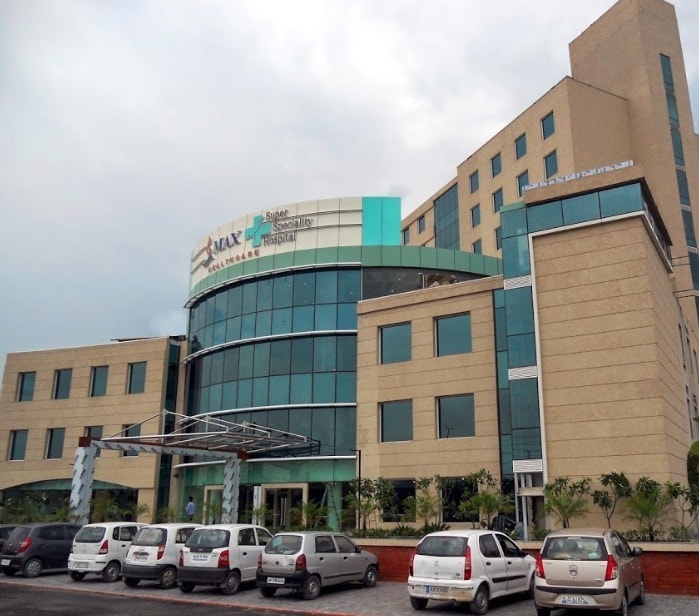Max Shalimar Bagh
Shalimar Bagh, New Delhi, Delhi 110088, India, India
Max Super Specialty Hospital, Shalimar Bagh is a 280 bedded super specialty hospital offering services across all major medical disciplines including Cardiology, Oncology, Neurosciences, Nephrology, Bariatric Surgery, Orthopedics, Kidney Transplant, Urology and Minimal Access.The hospital... read more
Send EnquiryAbout The Hospital
- Max Super Specialty Hospital, Shalimar Bagh is a 280 bedded super specialty hospital offering services across all major medical disciplines including Cardiology, Oncology, Neurosciences, Nephrology, Bariatric Surgery, Orthopedics, Kidney Transplant, Urology and Minimal Access.
- The hospital is counted among the best hospitals in North Delhi, with over 4,00,000 successfully treated patients.
- Max Super Specialty Hospital, Shalimar Bagh is also equipped with high-tech medical equipment such as MRI 1.5 Tesla, 16 Slice CT Scanner, Echo Machine Philips – IE33, Holmium Laser 100W, Neurosurgical Microscope and more.
- Not only this, as the best hospital in Delhi, the cancer care center has incorporated all the latest advancements in radiation therapy including Intensity Modulated RT ( IMRT), Image Guided RT ( IGRT), Stereotactic Body Radiation (SBRT) , SRS (Stereotactic Radiosurgery) and all kinds of Brachytherapy including Intraoperative RT (IORT).
- The experts at the Comprehensive Cancer Centre also offer Breast Conservation Surgeries (BCS), Cosmetic Reconstructive Surgery, Limb Conservation Surgery, Minimally Invasive Surgery, Sphincter Preservation Surgery and Hyperthermic Intraoperative Peritoneal Chemotherapy.
Treatments Offered
Top Doctors
Sr. Consultant – Medical Oncology
CONSULTS AT EXPEREIENCE :12 years SURGERIES :
NA
Treatment Starting at $6,300
Free Text ConsultTreatment Starting at $6,300
12 years SURGERIES :
NA TREATMENT COST
Starting at $6,300
Consultant - Pediatric Orthopedics
CONSULTS AT EXPEREIENCE :15 years SURGERIES :
NA
Treatment Price on request
Free Text ConsultTreatment Price on request
15 years SURGERIES :
NA TREATMENT COST
Treatment Price on request
Director - Department Of Gastroenterology
CONSULTS AT EXPEREIENCE :32 years SURGERIES :
NA
Treatment Price on request
Free Text ConsultTreatment Price on request
32 years SURGERIES :
NA TREATMENT COST
Treatment Price on request
Treatment Price on request
Free Text ConsultTreatment Price on request
13 years SURGERIES :
NA TREATMENT COST
Treatment Price on request
Patient Testimonials
Nearby Guest House
Team & specialisation
Infrastructure

Number Of Beds
280

Operation Theatres
NA

No Of Surgeon
5
Blogs

Comprehensive Guide to Vitiligo Treatment in India: Top Hospitals, Doctors, Costs & Treatments
Vitiligo is a chronic skin disorder that causes the loss of skin pigment. It can appear anywhere on the body, but it is most common on the face, hands, and feet. There is no cure for vitiligo, but there are treatments available that can help to restore pigment to the affected areas.Types of vitiligo treatment in IndiaThe following are some of the most common types of vitiligo treatment available in India:Topical treatments: These treatments are applied directly to the affected skin. Some common topical treatments for vitiligo include corticosteroids, calcineurin inhibitors, and tacrolimus.Light therapy: This treatment involves exposing the affected skin to ultraviolet (UV) light. Narrow-band UVB (NB-UVB) light therapy and excimer laser therapy are two of the most effective types of light therapy for vitiligo.Systemic medications: These medications are taken by mouth or injection. Some common systemic medications for vitiligo include methotrexate, cyclosporine, and apremilast.Surgery: Surgery can be used to transplant pigmented skin from one area of the body to the affected areas. This is a more invasive treatment option, but it can be effective for restoring pigment to large areas of skin.Causes of Vitiligo:Genetic Predisposition: A family history of vitiligo may increase the likelihood of developing the condition. However, it is not solely determined by genetics.Autoimmune Factors: Some researchers believe that vitiligo may be an autoimmune disorder, where the body's immune system mistakenly attacks and destroys melanocytes (pigment-producing cells).Neurochemical Factors: Changes in neurochemicals or neurotransmitters may contribute to the development of vitiligo.Environmental Triggers: Exposure to certain environmental factors, such as chemicals, sunburn, or emotional stress, may trigger the onset of vitiligo in genetically predisposed individuals.Viral or Bacterial Infections: Some studies suggest that infections may play a role in the development of vitiligo, though more research is needed in this area.Treatment Benefits:Repigmentation: The primary goal of vitiligo treatment is to stimulate repigmentation, helping to restore the natural color of the skin in affected areas.Improved Aesthetic Appearance: Treatment can lead to a more even skin tone, reducing the noticeable contrast between depigmented and pigmented areas.Enhanced Self-esteem and Confidence: Achieving repigmentation often leads to increased self-confidence and a positive impact on a person's overall well-being.Psychological Well-being: Treating vitiligo can alleviate the emotional distress and anxiety that may be associated with visible skin changes.Prevention of Further Spread: Some treatments may help prevent the spread of vitiligo to new areas of the skin.Customized Treatment Plans: Dermatologists can create personalized treatment plans tailored to the individual needs and preferences of the patient.Top Hospitals for Vitiligo Treatment in India:Fortis Skin Institute, DelhiMax Super Speciality Hospital, MumbaiApollo Hospitals, ChennaiBLK Super Speciality Hospital, New DelhiAditya Birla Hospital, KolkataCost of Vitiligo Treatment in India: The cost of vitiligo treatment in India varies depending on the type of treatment, the location of the treatment center, and the experience of the doctor. However, in general, vitiligo treatment is more affordable in India than in many other countries. Here is a sample breakdown of the cost of some common vitiligo treatments in India:Topical treatments: Rs. 500-3000 per monthLight therapy: Rs. 1000-2000 per sessionSystemic medications: Rs. 1000-5000 per monthSurgery: Rs. 50,000-100,000Conclusion:There are a number of effective vitiligo treatments available in India. With the right treatment, many people with vitiligo can achieve good results. If you are considering vitiligo treatment, it is important to talk to your doctor about your options.Additional Information:In recent years, there has been a growing interest in stem cell therapy for vitiligo. Stem cell therapy is a promising new treatment option that has the potential to restore pigment to the affected skin. However, more research is needed to determine the long-term safety and efficacy of stem cell therapy for vitiligo.If you are considering stem cell therapy for vitiligo, it is important to talk to your doctor about the risks and benefits of this treatment option.

Best hospitals for breast implant in india
Introduction:Embarking on the journey of breast augmentation is a personal decision that often involves meticulous consideration. Choosing the right hospital for breast implants is paramount for ensuring safety, precision, and achieving the desired results. In India, several hospitals stand out for their expertise in cosmetic surgery and breast implant procedures. These institutions combine advanced medical technology with skilled professionals to offer comprehensive and personalized care for individuals seeking breast enhancement.1. Fortis Memorial Research Institute, GurgaonSector - 44, Opposite HUDA City Centre Gurgaon, Haryana - 122002, India, IndiaFortis Memorial Research Institute (FMRI), Gurgaon, is a multi-super specialty, quaternary care hospital with an enviable international faculty, reputed clinicians, including super-sub-specialists and specialty nurses, supported by cutting-edge technology.A premium, referral hospital, it endeavours to be the 'Mecca of Healthcare' for Asia Pacific and beyond.Set on a spacious 11-acre campus with 1000 beds, this 'Next Generation Hospital' is built on the foundation of 'Trust' and rests on the four strong pillars Talent, Technology, Infrastructure and Service.Fortis Memorial Research Institute (FMRI) is a leading multi-super-speciality hospital in Gurgaon, India, offering a wide range of cosmetic and plastic surgery services, including breast implants.Breast implant surgery is a popular cosmetic procedure that can help women achieve their desired breast size and shape. Implants can also be used to reconstruct breasts that have been lost or damaged due to cancer, mastectomy, or other trauma.FMRI has a team of experienced and highly skilled cosmetic and plastic surgeons who are experts in breast implant surgery. The surgeons at FMRI use the latest techniques and technologies to ensure that patients receive the best possible results.FMRI offers a variety of breast implant options, including saline and silicone implants. Saline implants are filled with sterile saltwater, while silicone implants are filled with a silicone gel. Both types of implants are safe and effective, and the choice of implant will depend on the individual patient's needs and preferences.2. Max Healthcare SaketNew Delhi, Saket, IndiaMax Super Speciality Hospital is one of the topmost multi-specialty hospitals in capital city Delhi.The hospital has more than 500+ bedded facilities that offer treatment across all medical disciplines.Expert doctors of Max Hospital have treated more than 34+ lakh patients across all major specialties.Max Healthcare Saket is one of the leading hospitals in India for breast implant surgery. The hospital has a team of experienced and highly skilled cosmetic and plastic surgeons who are experts in the procedure. Max Healthcare Saket offers a variety of breast implant options, including saline and silicone implants, as well as different implant shapes and sizes.Breast implant surgery at Max Healthcare SaketThe breast implant surgery procedure at Max Healthcare Saket is typically performed under general anaesthesia. The surgeon will make an incision in the breast crease, under the arm, or around the nipple-areolar complex, depending on the patient's anatomy and the type of implant being used. Once the incision is made, the surgeon will create a pocket beneath the breast muscle or chest wall to insert the implant. The incision is then closed with sutures.3. Jaypee Hospital Jaypee Hospital Rd, Gobardhanpur, Sector 128, Noida, Uttar Pradesh 201304, IndiaThe Jaypee Hospital was conceptualised by our revered Founder Chairman, Shri Jai Prakash Gaur with the vision of promoting world-class healthcare amongst the masses by providing quality and affordable medical care with commitment.Jaypee Hospital is a multi-specialty hospital that offers a wide range of medical and surgical services, including breast implant surgery.The hospital has a team of experienced and qualified plastic surgeons who specialise in breast implant surgery.Jaypee Hospital offers a variety of breast implant options, including saline and silicone implants.The hospital also offers different implant shapes and sizes to suit the individual needs of each patient.4. Manipal Hospital, New DelhiSector 6 adjoining MTNL building, Main Rd, Dwarka, New Delhi, Delhi 110075, IndiaManipal Hospital Dwarka, is a multi-super specialty tertiary care healthcare facility, delivering world-class healthcare, at an optimum cost.Our aim is to deliver affordable, accessible and accurate healthcare to all sections of the society, without bias. With prominent doctors from across the globe all under one roof, cutting edge infrastructure of global standards in radio-diagnosis, research and clinical practices, and latest revolutionary and technological advancements.Manipal Hospital, New Delhi is a leading multi-specialty hospital that offers a wide range of medical and surgical services, including breast implant surgery. The hospital has a team of experienced and highly skilled plastic surgeons who specialise in breast implant surgery.Manipal Hospital, New Delhi offers a variety of breast implant options, including saline and silicone implants, as well as different implant shapes and sizes. The hospital also offers a variety of breast implant surgical techniques, including subglandular and submuscular placement.The breast implant surgery procedure at Manipal Hospital, New Delhi is typically performed under general anaesthesia. The surgeon will make an incision in the breast crease, under the arm, or around the nipple-areolar complex, depending on the patient's anatomy and the type of implant being used. Once the incision is made, the surgeon will create a pocket beneath the breast muscle or chest wall to insert the implant. The incision is then closed with sutures.Conclusion:In the realm of cosmetic surgery, selecting the best hospital for breast implants is pivotal for a successful and satisfying experience. The highlighted hospitals in India exemplify excellence in this field, with their proficient surgeons, state-of-the-art facilities, and a commitment to patient well-being. By prioritizing safety, aesthetics, and patient satisfaction, these hospitals have earned a reputation as trusted destinations for those considering breast augmentation. As individuals explore the possibilities of breast enhancement, these hospitals serve as beacons of reliability and proficiency in the realm of cosmetic breast surgery.

Apollo Hospital's Liver Transplant Costs: An Overview
IntroductionLiver transplantation is a life-saving procedure for individuals facing advanced liver diseases, such as cirrhosis or liver failure. Apollo Hospitals, a renowned chain of private healthcare facilities in India, offers liver transplant surgery at several of its locations, including Delhi, Chennai, Hyderabad, and Bangalore. While the prospect of a liver transplant can bring hope, it's essential to understand the financial aspects associated with this procedure. In this blog, we will break down the cost of a liver transplant at Apollo Hospitals and discuss important considerations related to financing.A. The Cost BreakdownThe cost of a liver transplant at Apollo Hospitals can vary significantly based on various factors, including the type of transplant, the patient's medical condition, and the specific hospital location. However, here is a general breakdown of the expenses you might encounter:1. Surgery (INR 5 lakhs):This includes the cost of the surgical procedure itself. It's a critical component of the total cost and often represents a substantial portion.2. Hospital Stay (INR 2 lakhs): The hospital stay covers expenses like room charges, board, and medications during your recovery period. This cost can vary depending on the duration of your stay.3. Post-operative Care (INR 1 lakh): Post-transplant care is essential for your recovery. It includes services such as physiotherapy and rehabilitation to ensure your well-being.4. Other Expenses (INR 1 lakh): Additional expenses, such as blood transfusions, laboratory tests, and miscellaneous fees, can accumulate during the transplant process.B. Understanding Insurance CoverageHealth insurance can significantly help with the cost of a liver transplant, but it's crucial to be aware that not all insurance policies will cover the full expense. Here are some key points to consider:1. Check Your Policy: Carefully review your health insurance policy to understand what aspects of the transplant are covered. Policies can vary, so it's essential to know the extent of your coverage.2. Types of Transplants: The cost of the transplant may vary depending on whether you have a cadaveric (deceased) donor or a living donor. The former can be more expensive.3. Complications: If you experience complications during or after the surgery, it may increase the overall cost of your transplant.C. Financial Assistance ProgramsIf the cost of a liver transplant at Apollo Hospitals is a concern, there are financial assistance programs available to help you manage the expenses:1. The Liver Foundation:This organization offers financial assistance to individuals in need of a liver transplant.2. The American Liver Foundation: Similar to The Liver Foundation, the American Liver Foundation provides financial aid to those seeking liver transplants.3. The National Patient Assistance Foundation: This foundation assists with covering prescription medication costs, which can be a significant part of post-transplant care.4. The Patient Advocate Foundation: It offers support for various financial, legal, and emotional challenges related to healthcare, including the costs associated with liver transplantation.ConclusionA liver transplant at Apollo Hospitals can be a life-changing procedure, but it's important to understand the financial aspects involved. By comprehending the costs, checking your insurance coverage, and exploring available financial assistance programs, you can better prepare for this critical journey towards improved health and a brighter future. Always consult with healthcare professionals and financial experts to make informed decisions about your liver transplant.Read more: Liver Cancer Symptoms: Recognizing the Early Warning Signs

Understanding Ear, Nose, and Throat Health: A Comprehensive Guide
IntroductionThe intricate network of our ears, nose, and throat plays a pivotal role in our sensory experiences, communication, and overall well-being. From hearing to smelling, breathing, and speaking, the functions of these interconnected organs are essential to our daily lives. In this comprehensive guide, we will explore the anatomy, functions, common issues, and tips for maintaining optimal ear, nose, and throat health.The Anatomy of Ear, Nose, and Throat1. The Ear's Structure and FunctionsThe ear, nose, and throat (ENT) collectively form a complex system with distinct structures and functions. 2. The Nose as an Airway and Olfactory HubThe ear consists of the outer, middle, and inner ear, responsible for hearing and balance. The nose serves as an airway for breathing and houses the olfactory receptors for smelling.3.The Throat: Facilitating Speech and Swallowing The throat includes the pharynx, larynx, and vocal cords, facilitating speech and swallowing.Hearing and Balance1. The Inner Ear's Crucial RoleThe inner ear plays a crucial role in hearing and balance. 2. Sound Processing and Balance MaintenanceSound waves are converted into electrical signals that the brain interprets as sound. The vestibular system within the inner ear helps maintain balance and spatial orientation.Olfaction and Smell1. The Olfactory System: Our Sense of SmellThe olfactory system in the nose allows us to perceive and distinguish various scents. 2. The Interplay of Smell and TasteThe smell is closely linked to taste and can evoke memories and emotions.Breathing and Airway Health1. The Nose's Role in BreathingThe nose serves as the primary passage for breathing, filtering and humidifying incoming air. 2. Air Filtration and ConditioningIt also warms and moistens air before it reaches the lungs. Maintaining clear airways is crucial for proper breathing.Speech and Swallowing1. The Throat's Significance in SpeechThe throat, including the larynx and vocal cords, plays a vital role in speech production. 2. Muscles and Structures for CommunicationThe coordinated movements of the muscles and structures in the throat enable us to produce different sounds and communicate effectively.Read also- Tonsillectomy (Tonsil Removal Surgery): All You Need to KnowCommon ENT Issues1. A Spectrum of ENT ChallengesCommon issues related to the ears, nose, and throat include ear infections, hearing loss, sinusitis, allergies, tonsillitis, voice disorders, and more.2. Early Symptom Recognition and Medical Care Identifying symptoms early and seeking medical attention can prevent complications.7. Tips for Maintaining ENT HealthPractice Good Hygiene: Regularly clean your ears and nose to prevent the accumulation of debris and germs.Protect Your Ears: Use ear protection in loud environments to prevent noise-induced hearing loss.Stay Hydrated: Drinking water keeps the throat and vocal cords lubricated, aiding speech and swallowing.Manage Allergies: Address allergies promptly to reduce inflammation and congestion in the nose and throat.Avoid Smoking: Smoking irritates the ENT system and increases the risk of various issues, including throat cancer.8. Seeking Professional Care When to Consult an OtolaryngologistSuppose you experience persistent issues like hearing RE, chronic sinus problems, voice changes, or persistent throat discomfort. In that case, it's important to consult an ear, nose, and throat specialist (otolaryngologist) for proper diagnosis and treatment.ConclusionUnderstanding the intricate functions of the ear, nose, and throat is key to maintaining their health and well-being. From sensory experiences to communication, these organs contribute significantly to our quality of life. By adopting healthy habits, seeking medical attention when needed, and appreciating their intricate roles, we can ensure the optimal functioning of our ENT system and enjoy a life filled with vibrant sensory experiences and effective communication.Read more: Burjeel Hospital's ENT, Head and Neck Surgery








